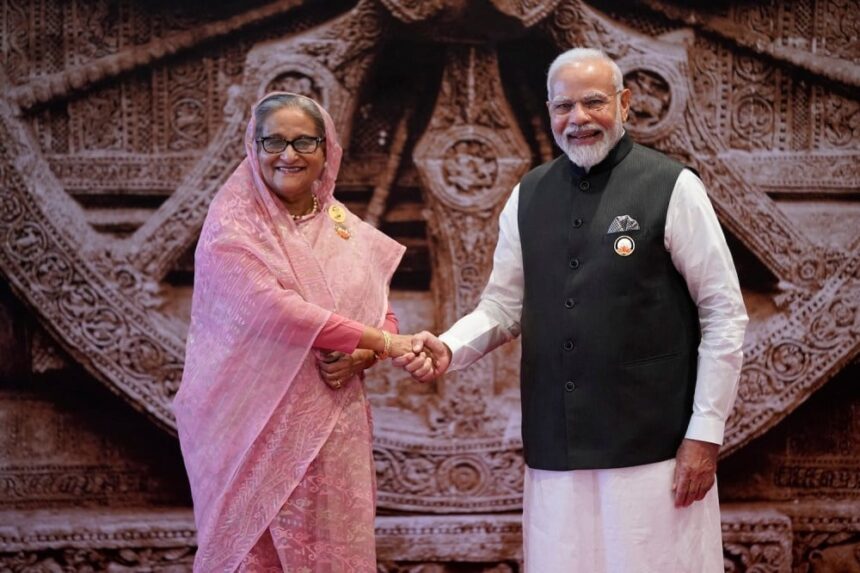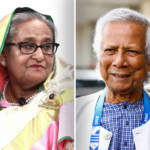Bangladeshi Prime Minister Sheikh Hasina has resigned due to nationwide protests, and she has fled to India. The protests started over civil service job quotas but then turned into widespread opposition, leading to a government crackdown.
After Hasina’s departure, Nobel laureate Muhammad Yunus was appointed as an interim leader. This has raised concerns in India about the future direction of Bangladesh, especially since there is a potential for a government that is pro-China.
India had strong ties with Hasina’s government, especially in ‘counterterrorism’ and shared water resources. However, now India faces uncertainty about its regional influence.
The situation also increases concerns about the treatment of Bangladesh’s Hindu minority, which could impact Indian domestic politics.
India is particularly worried about Bangladesh’s growing military ties with China and its participation in China’s Belt and Road Initiative. Additionally, the potential return of Begum Khaleda Zia, a political leader who is not favorable to India, adds to the tension.
Indian opposition parties are pressuring the Modi government to address these developments because they could significantly affect India’s foreign policy and regional security.
Read more below.
India’s Uncertain Future in Bangladesh
Faced with nationwide antigovernment protests, Bangladeshi Prime Minister Sheikh Hasina resigned on Monday, boarding a military helicopter and fleeing the country. When Hasina, who held office since 2009, initially landed at the Hindon air force base outside of New Delhi, Indian National Security Advisor Ajit Doval was on hand to greet her. Should she seek it, the Indian government would likely grant her asylum, even if it alienates an interim government in Bangladesh.
Faced with nationwide antigovernment protests, Bangladeshi Prime Minister Sheikh Hasina resigned on Monday, boarding a military helicopter and fleeing the country. When Hasina, who held office since 2009, initially landed at the Hindon air force base outside of New Delhi, Indian National Security Advisor Ajit Doval was on hand to greet her. Should she seek it, the Indian government would likely grant her asylum, even if it alienates an interim government in Bangladesh.
The protests began weeks ago in response to civil service job quotas for Bangladeshi freedom fighters and their families; the protests morphed, and the government cracked down hard. On Tuesday, after Hasina’s resignation, the country’s parliament was dissolved and President Mohammed Shahabuddin appointed Nobel laureate Muhammad Yunus to lead an interim government. The abrupt shift presents a dilemma for India. A new elected government in Dhaka could have significant implications for its domestic politics and foreign policy, affecting trade, regional security, and transnational ties.
That Doval met Hasina on Monday exemplifies the significance that Indian Prime Minister Narendra Modi’s government attached to its bilateral relationship with Bangladesh under her leadership. Modi cultivated a close partnership with Hasina’s government. He was prepared to overlook many shortcomings of her tenure, including blatant human rights violations, as long as her government was willing to crack down on Islamist radicals within Bangladesh and work with India on the fraught issue of shared water resources. India, in turn, was willing to provide Bangladesh with substantial economic and military assistance.
New Delhi’s ties with Dhaka are long-standing: India was instrumental in the founding of Bangladesh as it gained independence from Pakistan in 1971. However, relations have not always been smooth—owing to the issue of water sharing, as well as India’s concerns about migration from Bangladesh. Nor was India content with long stretches of military rule in Bangladesh in the 1970s and 1980s. A bloody 1975 military coup involved the assassination of President Sheikh Mujibur Rahman, the founder of Bangladesh (and Hasina’s father), who was close to New Delhi. Bangladesh’s military governments were also to varying degrees sympathetic to Pakistan, India’s irksome neighbor.
With Hasina’s resignation, India now has two compelling concerns. First, India must be anxious about the government that will emerge in Bangladesh. Given the Awami League government’s harsh crackdown, it is unlikely that the party will be able to stage a comeback when elections are eventually held. The cozy relationship that New Delhi enjoyed with Dhaka during Hasina’s tenure is now at considerable risk. At best, India can reach out to Bangladesh’s military establishment in the hope that it can maintain some influence in the country—but this won’t be an easy task, given how the military has historically viewed New Delhi. Second, India will be especially wary about any future government turning toward China.
These misgivings are understandable, as Bangladesh is a site of India-China competition. Bangladesh appeared to be increasingly warming to China, seeking to acquire a range of military equipment, including submarines and fighter jets. Adding to New Delhi’s distress, Dhaka recently decided to hold military exercises with Beijing, indicating that it was prepared to work more closely with China. Furthermore, Bangladesh has signed on to China’s Belt and Road Initiative. India, while more than willing to aid Bangladesh with infrastructure development, could not effectively compete with China’s financial resources.
Unfolding developments in Bangladesh will likely feed this competition. One of them is Shahabuddin’s decision to release Begum Khaleda Zia, the leader of the main opposition Bangladesh Nationalist Party (BNP). The widow of a former military officer-turned-president, Zia was incarcerated in 2018 on corruption charges. She served as prime minister from 1991 to 1996 and from 2001 to 2006; she showed no particular fondness for India during her tenure and also worked with members of Bangladesh’s Islamist parties. New Delhi will be vigilant about her next moves, especially given that she is likely to be close to the military establishment.
Finally, Modi’s government—beholden to a vast Hindu constituency at home—will closely watch out for violence against the Hindu community in Bangladesh. Some of the protesters have resorted to attacks against minority Hindus and their places of worship; the Awami League was seen as sympathetic to Hindu rights, even as its record of protecting them was not exemplary. (A former member of Hasina’s cabinet admitted as much after leaving government.) Some members of Modi’s Bharatiya Janata Party have raised concerns in the past about the plight of the Hindu community in Bangladesh.
Modi’s government will be forced to speak out against such incidents sooner rather than later—especially now that it does not enjoy a majority in Parliament. India’s political opposition, which is aware of the government’s potential vulnerability on the issue, is unlikely to remain silent on it for long. Already, the Indian National Congress party has placed the government on notice: After a parliamentary session this week, opposition leader Rahul Gandhi asked Indian External Affairs Minister S. Jaishankar about the government’s strategy in Bangladesh, putting the ruling party on the spot.
Despite Bangladesh’s proximity to India and the ethnic and cultural ties that bind the two countries, the Modi government failed to anticipate the strength and virulence of the opposition to Hasina—its partner of choice in Dhaka. India now faces a regional crisis with ramifications for both its domestic politics and its foreign policy. Until law and order is restored in Bangladesh, India’s government must seek to prevent a drastic decline in its influence in Dhaka. Between the possibility of the BNP and some of its Islamist allies returning to office and China stepping into the breach, the strength of India’s relations with Bangladesh hangs in the balance.
By Sumit Ganguly
Source: Foreign Policy







